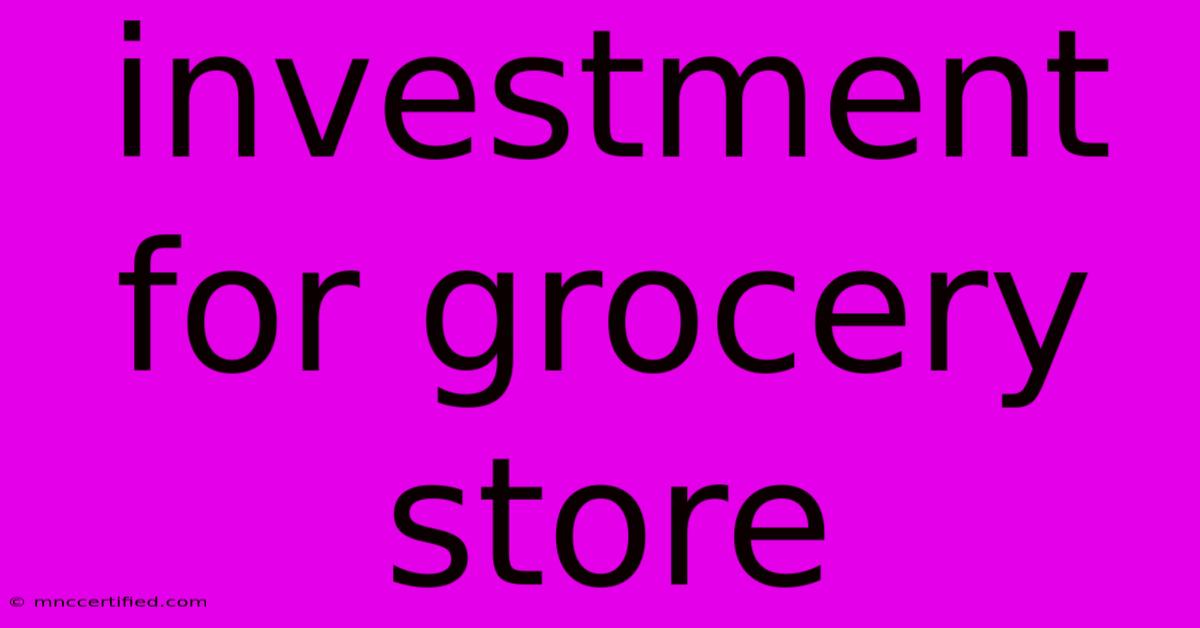Investment For Grocery Store

Table of Contents
Investing in a Grocery Store: A Comprehensive Guide
Investing in a grocery store can be a lucrative venture, but it requires careful planning and execution. This comprehensive guide will walk you through the key considerations, from market analysis to operational strategies, to help you make an informed decision. Whether you're considering opening your own store, acquiring an existing one, or investing in a grocery store chain, understanding these factors is crucial for success.
Market Research: The Foundation of Your Investment
Before investing a single dollar, thorough market research is paramount. This involves:
- Analyzing your target market: Who are your potential customers? What are their demographics, income levels, and shopping habits? Understanding your target audience is key to tailoring your offerings and marketing strategies. Consider factors like proximity to residential areas, competition, and local economic conditions.
- Competitive analysis: Identify your competitors and analyze their strengths and weaknesses. What makes them successful? What are their pricing strategies? What are their product offerings? This will help you differentiate your store and establish a competitive advantage. Keyword: Grocery store competitive analysis
- Location, location, location: The location of your grocery store is critical to its success. Consider factors like foot traffic, accessibility, parking availability, and proximity to residential areas and other businesses. Keyword: Grocery store location analysis
- Demand analysis: Assess the overall demand for groceries in your chosen area. Is there an unmet need? Are there specific product categories that are underserved? This will inform your inventory decisions and marketing efforts. Keyword: Grocery store market demand
Financial Planning: Budgeting for Success
Investing in a grocery store requires significant capital. Develop a detailed financial plan that includes:
- Start-up costs: This includes the cost of leasing or purchasing a property, purchasing equipment (refrigeration, shelving, point-of-sale systems), initial inventory, and licenses and permits. Keyword: Grocery store startup costs
- Operating expenses: These are ongoing costs such as rent, utilities, salaries, inventory, marketing, and insurance. Accurate forecasting of operating expenses is vital for profitability. Keyword: Grocery store operating expenses
- Funding sources: Determine how you will finance your investment. Options include personal savings, loans from banks or credit unions, and attracting investors. Keyword: Grocery store financing options
- Profitability projections: Create realistic projections of your revenue and expenses. This will help you assess the potential return on your investment and identify potential risks. Keyword: Grocery store profitability analysis
Operational Strategies: Running a Successful Grocery Store
Efficient operations are crucial for maximizing profitability. This includes:
- Inventory management: Implement an efficient inventory management system to minimize waste and ensure you always have the right products in stock. This includes considering perishables and their turnover rates. Keyword: Grocery store inventory management
- Supply chain management: Establish strong relationships with suppliers to ensure a reliable and cost-effective supply of goods. Negotiating favorable terms with suppliers can significantly impact your profitability. Keyword: Grocery store supply chain
- Staffing and training: Hire and train competent staff who provide excellent customer service. Employee training on efficient handling of inventory and customer interaction is critical. Keyword: Grocery store employee training
- Marketing and promotions: Develop a marketing strategy to attract and retain customers. This could include loyalty programs, special offers, and advertising. Keyword: Grocery store marketing strategies
Legal and Regulatory Compliance
Ensure full compliance with all relevant laws and regulations, including:
- Food safety regulations: Adhere to strict food safety standards to prevent foodborne illnesses. Keyword: Grocery store food safety regulations
- Licensing and permits: Obtain all necessary licenses and permits to operate legally. Keyword: Grocery store licensing requirements
- Labor laws: Comply with all applicable labor laws regarding wages, hours, and working conditions. Keyword: Grocery store labor laws
Exit Strategies: Planning for the Future
Consider your exit strategy from the outset. This might involve selling the business, franchising, or passing it on to family members. A well-defined exit strategy will help you maximize your return on investment.
By carefully considering these factors and developing a comprehensive business plan, you can significantly increase your chances of success in investing in a grocery store. Remember, ongoing adaptation and responsiveness to market changes are crucial for long-term profitability.

Thank you for visiting our website wich cover about Investment For Grocery Store. We hope the information provided has been useful to you. Feel free to contact us if you have any questions or need further assistance. See you next time and dont miss to bookmark.
Featured Posts
-
Manchester United Duo Risk Arsenal Ban
Dec 01, 2024
-
Bundesliga Dortmund Vs Bayern Starting Xi
Dec 01, 2024
-
New Hmrc Rules Warning For Drivers
Dec 01, 2024
-
Dharma Trading Discount Code
Dec 01, 2024
-
Best Black Friday Tech Deals Now
Dec 01, 2024